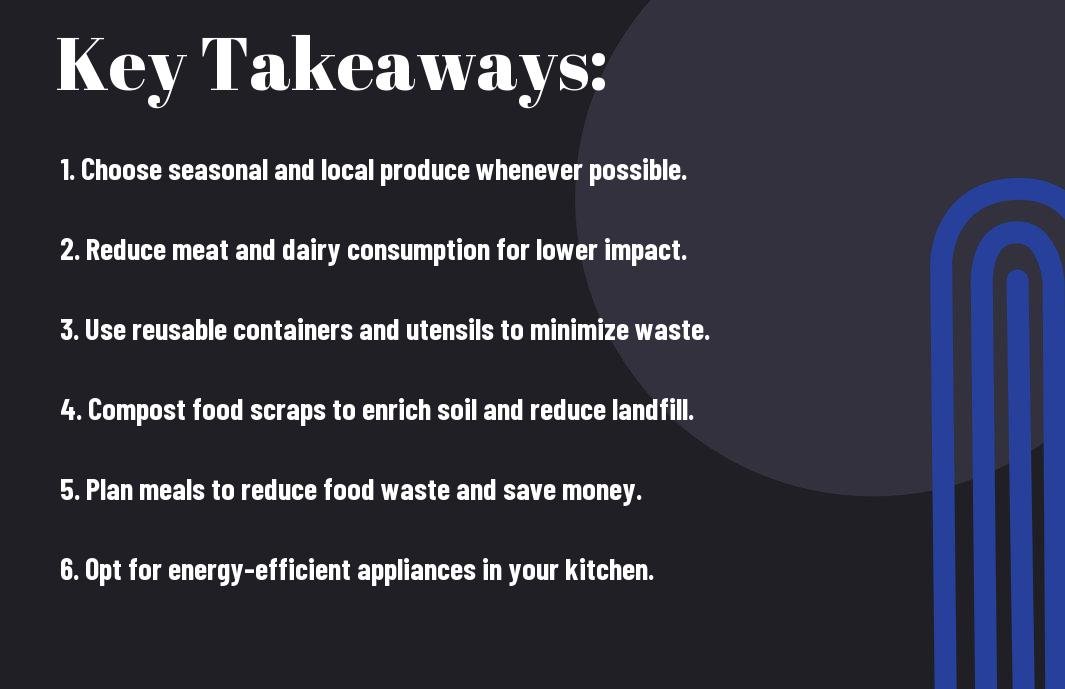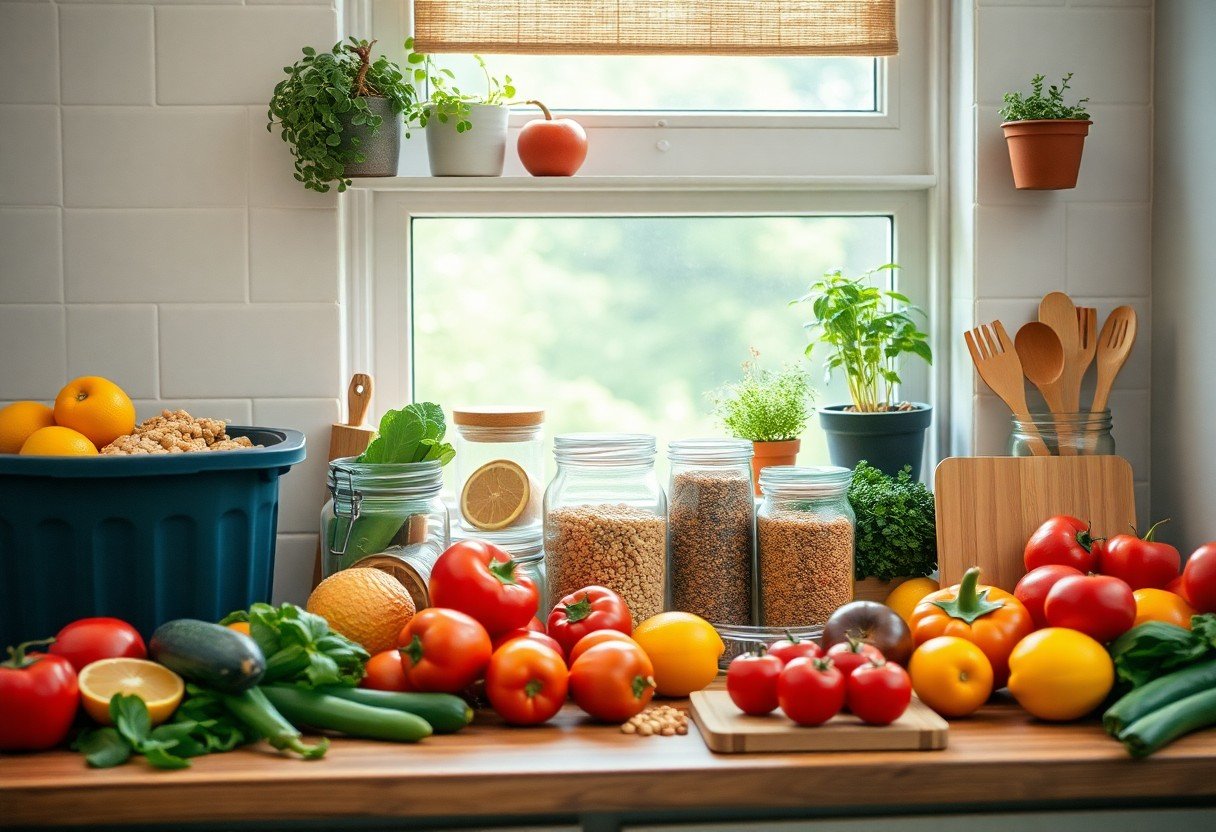Many people are becoming increasingly aware of their impact on the planet, making sustainable eating a priority in their everyday lives. By adopting eco-friendly practices in your kitchen, you can significantly reduce your carbon footprint and promote a healthier environment. This blog post will provide you with practical tips to transform your cooking habits, from sourcing local ingredients to minimizing food waste. Whether you are a beginner or a seasoned pro, these strategies will help you make positive changes that benefit both your health and the planet.

Understanding Sustainable Eating
A sustainable eating approach emphasizes making food choices that are not only good for you but also beneficial for the environment. This means considering the entire food system, from production and consumption to waste management, and opting for practices that minimize environmental impact while promoting health and well-being.
Definition of Sustainable Eating
Sustainable eating refers to the consumption of food in a way that supports human health, conserves biodiversity, and minimizes the carbon footprint associated with food production. This means choosing local, seasonal, and organic options that respect animal welfare and preserve natural resources.
Importance of Sustainable Food Choices
After understanding the definition, know that sustainable food choices play a significant role in combating climate change and promoting a healthier planet. These choices can lead to reduced greenhouse gas emissions, improved soil health, and preserved ecosystems, ultimately benefiting both you and future generations.
Even small changes in your eating habits can lead to significant positive outcomes. By choosing sustainably sourced foods, you actively contribute to reducing pollution and deforestation, while promoting biodiversity. This, in turn, supports local farmers and economies, strengthens food security, and fosters a healthier diet rich in nutrient-dense foods. Your choices matter; they can help create a more sustainable future for both the planet and humanity.

Eco-Friendly Kitchen Practices
Assuming you want to create a sustainable kitchen, implementing eco-friendly practices is important. This includes using energy-efficient appliances, minimizing single-use plastics, and incorporating eco-friendly cleaning supplies. By adopting these practices, you significantly reduce your carbon footprint and create a healthier environment for yourself and your family.
Reducing Food Waste
An effective way to support sustainability is by actively reducing food waste in your kitchen. You can achieve this by planning meals, using leftovers creatively, and composting organic waste. By being mindful of your consumption, you not only save money but also contribute to minimizing the amount of food that ends up in landfills.
Efficient Food Storage Solutions
Practices that promote efficient food storage can greatly extend the lifespan of your produce and leftovers. Use airtight containers to keep food fresh and avoid spoilage. Additionally, incorporating glass jars and reusable bags can help you store bulk items, further reducing packaging waste. Labeling your containers ensures that you consume items before they go bad, thus minimizing waste and saving you money.
In addition to promoting sustainability, investing in efficient food storage solutions enhances your overall kitchen organization. Use clear containers to easily identify contents and keep your kitchen tidy. Consider compartments for different produce types to maintain their freshness longer. Properly stored food not only stays edible for an extended period but also reduces the risk of foodborne illnesses, ensuring safety for you and your loved ones.
Sourcing Sustainable Ingredients
Once again, embracing sustainable ingredients in your kitchen is vital for reducing your environmental footprint. By consciously selecting what you put on your plate, you can support eco-friendly practices and promote a healthier planet. This means being mindful of where your food comes from, how it’s grown, and the implications of those choices on your health and the environment.
Local and Seasonal Produce
Across various regions, the benefits of consuming local and seasonal produce are significant. Not only does this practice support your local economy, but it also reduces the energy used in transportation, ensuring you enjoy the freshest ingredients available. Additionally, seasonal produce is usually more nutrient-dense, delivering better flavors and supporting sustainable farming practices.
Choosing Organic and Ethical Options
Beside focusing on local options, you should prioritize organic and ethical ingredients in your kitchen. These choices ensure reduced exposure to synthetic pesticides, fertilizers, and genetically modified organisms (GMOs), promoting a healthier diet for you and the environment.
Seasonal produce is often grown using methods that prioritize sustainability, contributing to the conservation of ecosystems and biodiversity. By choosing organic and ethical options, you support farmers who practice responsible land management and animal welfare standards. This approach not only improves your health by minimizing harmful chemicals in your food but also fosters a more equitable food system. By prioritizing these choices, you can significantly impact community health and impact the broader environment positively.
Sustainable Cooking Methods
Now that you understand the importance of sustainable eating, let’s investigate into cooking methods that minimize your environmental impact. By selecting techniques that preserve nutrients and flavors, you can also reduce energy consumption and food waste in your kitchen. Opting for sustainable cooking methods not only benefits the planet but enhances your culinary experience.
Energy-Efficient Cooking Techniques
Across the kitchen, simple changes can lead to significant energy savings. Using a pressure cooker, slow cooker, or microwave reduces cooking time and energy usage. Moreover, keeping your pots and pans covered while cooking retains heat, thereby cutting down the energy needed to prepare your meals. Incorporating these methods can make your cooking more eco-friendly.
Plant-Based Meal Ideas
One of the most effective ways to foster sustainability in your kitchen is by incorporating more plant-based meals into your diet. Transitioning to a plant-based diet can substantially lower your carbon footprint, as it typically requires fewer resources than meat production.
The key benefits of plant-based meal ideas lie in their ability to enhance your health while being better for the planet. You can whip up delicious meals using ingredients like quinoa, lentils, beans, and seasonal vegetables. Try dishes such as stir-fried tofu with mixed vegetables or a hearty chickpea salad. Not only do these meals offer a variety of flavors and textures, but they also help to minimize your ecological footprint. Embracing plant-based cooking is a positive step toward a sustainable kitchen, allowing you to enjoy nutritious meals while supporting environmental conservation.

Eco-Conscious Grocery Shopping
To elevate your grocery shopping experience and contribute positively to the environment, you can make informed choices that align with sustainability. Explore Tips for Sustainable Cooking- Techniques and Benefits to enhance your eco-friendly kitchen practices.
Tips for Sustainable Shopping
Shopping sustainably involves taking steps that benefit both the environment and your health. Consider these tips when you’re at the store:
- Choose local produce to reduce your carbon footprint.
- Opt for seasonal fruits and vegetables for better freshness and flavor.
- Avoid single-use plastics by bringing your own bags and containers.
Perceiving the impact of your choices instills greater responsibility in your shopping habits.
Reading Labels for Eco-Friendliness
Below the surface of product labels lies vital information that can guide you towards sustainable choices.
Sustainable label reading allows you to identify organic, non-GMO, and fair trade certifications, helping you make environmentally conscious decisions. Watch for harmful additives that may negatively impact your health and the environment. Furthermore, be aware of packaging materials – prioritizing items with recyclable or biodegradable packaging supports a circular economy. By engaging in this mindful practice, you contribute to a healthier planet and community.
Meal Planning for Sustainability
For a more sustainable kitchen, meal planning can dramatically reduce food waste and help you use seasonal ingredients. By taking the time to plan your meals for the week, you can ensure that you purchase only what you need, minimizing excess and ensuring nothing goes to waste. Incorporating local and organic produce into your menu also supports eco-friendly practices while contributing to a healthier lifestyle.
Creating a Sustainable Meal Plan
Plan your meals around seasonal produce and what you have on hand to limit waste. Make a list of meals for each day of the week, focusing on ingredients that can be used in multiple dishes to maximize efficiency. Consider incorporating plant-based proteins and whole grains, as these are not only better for the environment but also beneficial for your health.
Cooking in Batches
Around a busy lifestyle, cooking in batches allows you to save time while ensuring you have healthy meals ready to go. Batch cooking involves preparing larger quantities of food at once, which you can divide into portions for future meals. This method not only helps you reduce food waste by using up ingredients effectively, but it also limits the need for takeout, cutting down on carbon emissions associated with food delivery.
Further, batch cooking is a fantastic way to enhance your overall sustainability efforts in the kitchen. You can make large quantities of soups, stews, or casseroles and store leftovers in the fridge or freezer. This practice ensures you have healthy options available during busy weeks, reducing the temptation to opt for processed foods. Additionally, you’ll find that preparing meals in larger quantities can lead to less water and energy consumption overall, making your cooking process more eco-friendly and efficient. When you embrace batch cooking, you also provide your family with nutritious meals while supporting your sustainable eating journey.
To wrap up
From above, you can see that adopting sustainable eating habits can significantly benefit both your health and the environment. By making informed choices such as prioritizing local produce, minimizing food waste, and exploring plant-based options, you can transform your kitchen into an eco-friendly space. Embracing these practices not only supports sustainable agriculture but also fosters a more responsible culinary culture. For more insights, explore this guide on Embracing Sustainable Eating to enhance your eco-conscious journey.









